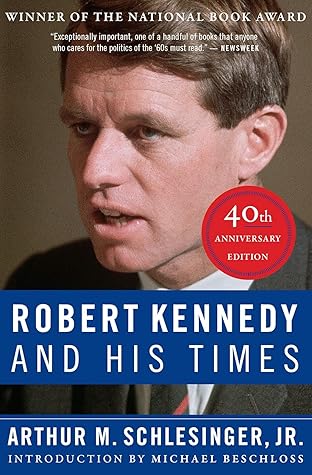More on this book
Kindle Notes & Highlights
His brother’s assassination in November 1963 devastated him. For weeks, for months, he wandered in grief. Yet in a paradoxical sense it liberated him too. He had repressed his inner self since childhood, first to prove himself to his father, then to help his brother. In 1961 his father was disabled by a stroke; now his brother was dead.
Robert Kennedy died on June 6, 1968, at the age of forty-two—a
Kenneth O’Donnell, who described himself as “one of the few Irish Democrats that were violently anti-McCarthy in the state of Massachusetts,” used to call Robert Kennedy and fulminate about McCarthy.
John and Jacqueline were married in September 1953 at Newport. The Kennedys gathered in advance at Hyannis Port.
Hubert Humphrey was one of the brightest and most likable men in the Democratic party. Though he and John Kennedy were in broad agreement on issues, their lives could hardly have been more different. Nearly forty-nine, six years older than Kennedy, Humphrey had come of age during the depression, growing up a druggist’s son amidst the dust storms of South Dakota. He worked his way through college, taught, entered politics and flashed into national attention as the fiery champion of civil rights in the Democratic convention of 1948. He was a man of swift intelligence, immense sympathy and great
...more
In an election-night interview Walter Cronkite of CBS asked John Kennedy about the Catholic vote. Kennedy answered frigidly. As soon as the interview was over, as Cronkite later recalled it, “Bobby stormed through the studio saying, ‘You violated an agreement! We had an agreement that no question be asked about Catholicism and the Catholic vote. . . . I’m going to see that you never get another interview.’”
There was a month to go. John Kennedy addressed the religious issue—“Nobody asked me if I was a Catholic when I joined the United States Navy”29—and a state filled with kindly and patriotic people responded to the appeal for tolerance.
Hoover was a bachelor who had lived for years with his mother. After her death his cherished companion was an FBI associate, Clyde Tolson. He had a brother and sister, but George Allen could not recollect his ever mentioning them.11 His extracurricular passion was to go to the races with Tolson and Allen. He was obsessed by what he saw as a decline in sexual morality and was exercised even over the personal appearance of FBI agents. He detested long hair and beards. Jackets were to be worn. Suits were to be dark, shirts white, ties conservative. Red ties were evidence of insincerity. He
...more
Roosevelt saw wiretapping primarily as a wartime measure of counterespionage. After his death and the war’s end the FBI continued to tap. The Cold War offered new justification.
In 1961, as Kennedy became Attorney General, the situation was as follows: (1) the FBI could wiretap only on the written authorization of the Attorney General; (2) state and local police taps, often stimulated by the FBI, went freely along as state law permitted; (3) the FBI bugged ad lib at the director’s discretion and without notice to Attorneys General; (4) the FBI indulged ad lib in surreptitious entry in order to install bugs or for other purposes, and did so without the knowledge of any Attorney General.*
The word in the FBI, said William Sullivan, was that the two men in the world J. Edgar Hoover hated most were Martin Luther King second and Robert Kennedy first.
“the Irish were not wanted there. Now an Irish Catholic is President of the United States.


